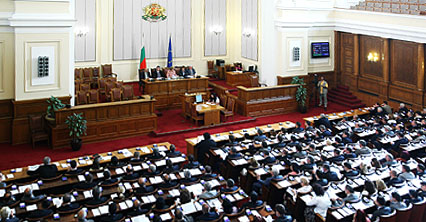
According to the adopted provisions the Central Election Commission is to be appointed by presidential decree for a term of five years. The CEC members will be appointed after consultation and on proposal of parliamentary parties and coalitions represented in the Bulgarian parliament as well as by extra parliamentary political forces represented in the European Parliament.
Members of the district and municipal election commissions must have a university degree, speak Bulgarian and comply with the residence qualification corresponding to the type of election held. The draft Electoral Code recommends that members of the central, district and municipal election commissions, should be lawyers. It also envisions that the chair and secretary of electoral commissions cannot be proposed by the same party or coalition.
The parliament approved the proposal of the Ataka PG elections to be held on Sundays in the whole country. Elections for members of the EU parliament will be carried in the period specified by the Council of the European Union. The Code provides that elections for national representatives and MEPs are to be scheduled by the President of Bulgaria not later than 75 days before the vote. Parliament too schedules elections for President and Vice President not later than 75 days before voting day.
The deputies decided that the allocation of seats for municipal councillors will be done among the parties, coalitions and independent candidates which have received votes not less than the municipal electoral quota. According to the texts adopted, the elections for municipal councillors will be carried according to a proportional system of registered parties, coalitions and independent candidates’ lists in multi mandate electoral districts(constituencies).
The right to be elected or to elect councillors and mayors will have Bulgarian and foreign nationals, who are citizens of EU member countries and do not have another citizenship from a country outside the European Union, on condition that they have resided in the respective municipality or borough for the last 12 months preceding the election. Candidates must be 18 years or older on Election Day, be not placed under guardianship and not serving prison sentence.
Parliament decided that the borough mayors in Sofia, Plovdiv and Varna will not be elected directly, but appointed by the municipal mayors. The new Electoral Code sets the rules of organization and carrying out of elections for representatives of the National Assembly and the European Parliament, for President and Vice President, , for municipal councillors, for municipal and borough mayors and the requirements for candidates.
The new Code stipulates that the CEC (Central Electoral Commission) will decide on the membership of the District Electoral Commissions ( DEC) if political parties and coalitions fail to reach agreement.
According to the new provisions, the CEC may refuse to register a party when it finds that the latter has not held the meetings of its supreme body, as foreseen in its statutes, for more than two consecutive times and not once in the last five years, and has not presented for recording in the court the names of its new leadership. In the elections for president and vice president the CEC will announce the results of the elections and set a new election date, if no candidate is elected, in accordance with Art. 93, para 3 of the Constitution.
The Central Election Commission (CEC) will appoint the Sectional Electoral Commissions ( SEC) abroad for all polling stations no later than 12 days before Election Day. This rule will apply to the election for President, National Assembly and representatives in the European Parliament. The members of the electoral commissions abroad will be proposed by the Minister of Foreign Affairs or his authorized Deputy Minister, after consultation with parliamentary forces represented in parliament and those out of it, which have representatives elected in the European Parliament. If an agreement is not reached, the Foreign minister selects the members of the SEC alone. Each Sectional Election Commission abroad will include a member proposed by the Minister of Foreign Affairs and appointed by the Central Electoral Commission. The travel expenses of the members of the SЕC abroad are covered by their respective party or coalition. The SECs in foreign countries will consist of not more than 7 members and not less than 5 for constituencies of not more than 500 voters. Where the number of voters will be more than 500 the SEC will have 9 or not less than 5 members.

- 22/04/2021
The Parliament imposed a moratorium on concessions, real estate deals and appointments pending the election of a new cabinet or caretaker government - 16/04/2021
By 156 votes “in favour”, the National Assembly accepted the resignation of the Council of Ministers with Prime Minister Boyko Borisov - 15/04/2021
Speech by Mrs. Iva Miteva upon her election as a President of the 45th National Assembly - 15/04/2021
The Member of Parliament Iva Miteva was elected President of the 45th National Assembly - 15/04/2021
The Members of the 45th National Assembly were officially sworn in - 03/03/2021
The President of the National Assembly Tsveta Karayancheva and MPs attended the solemn fireworks-retreat on the occasion of the Liberation of Bulgaria - 03/03/2021
Every Bulgarian should preserve and honour the memory of those glorious ancestors, thanks to whom Bulgaria exists today, said the President of the National Assembly Tsveta Karayancheva in Gabrovo - 03/03/2021
Today we are on Shipka to pay our respects to all the heroes who sacrificed their lives for freedom, said the President of the National Assembly Tsveta Karayancheva after climbing Shipka Peak together with young people from all over the country - 02/03/2021
The Vice-President of the National Assembly Valeri Simeonov received an award from the Bulgarian Republican Self-Government in Hungary - 26/02/2021
The Parliament adopted at second reading amendments to the Measures Against Money Laundering Act
 Български
Български English
English